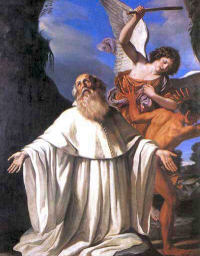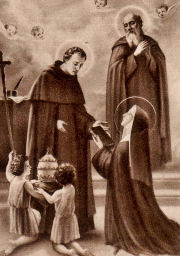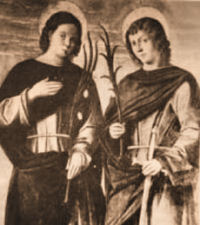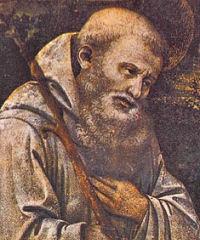Catholic Culture
Ordinary Time: June 19th
Optional Memorial of St. Romuald, abbot
MASS READINGS
June 19, 2018 (Readings on USCCB website)
COLLECT PRAYER
O God, who through Saint Romuald renewed the manner of life of hermits in your Church, grant that, denying ourselves and following Christ, we may merit to reach the heavenly realms on high. Through our Lord Jesus Christ, your Son, who lives and reigns with you in the unity of the Holy Spirit, one God, for ever and ever.
Tuesday of the Eleventh Week in Ordinary TimeO God, strength of those who hope in you, graciously hear our pleas, and, since without you mortal frailty can do nothing, grant us always the help of your grace, that in following your commands we may please you by our resolve and our deeds. Through our Lord Jesus Christ, your Son, who lives and reigns with you in the unity of the Holy Spirit, one God, for ever and ever.
show
Recipes (1)
show
Activities (1)
show
Prayers (2)
show
Library (1)
» Enjoy our Liturgical Seasons series of e-books!
Old Calendar: Corpus Christi ; St. Juliana of Falconieri, virgin; Saints Gervase and Protase, martyrs
St. Romuald was born in Ravenna of a noble family. Founder of the Camaldolese monks — one of the Italian branches of the Benedictines — in which the eremitical life is combined with life in community. He died in 1027, after a life of prayer and rigorous penance. In the Extraordinary Form his feast is celebrated on February 9.
According to the 1962 Missal of St. John XXIII the Extraordinary Form of the Roman Rite, today is the feast of St. Juliana of Falconieri who was born in Florence in 1270. She was about fifteen when, at the end of 1284, St. Philip Benizi, General of the Servite Order, received her among the Mantellatae, the female branch of the Order. She had a great devotion to the Holy Eucharist and practiced to a rare degree the Servite devotion to the Sorrows of our Lady. She died in Florence in 1341.
Today is also the commemoration of Sts. Gervase and Protase who were martyred at Milan in the second century. St. Ambrose discovered their bodies in 386. They rest now, with the body of St. Ambrose himself on the altar of the crypt of St. Ambrose church at Milan. They are invoked in the Litany of the Saints.
St. Romuald
 St. Romuald, the founder of the Camaldolese Order, could not decide for a considerable time whether to serve God in a religious life or to remain in the world. After his father killed a relative in a duel at which Romuald was forced to be present, he went to the monastery of St. Apollinaris, near Ravenna, and did penance for forty days. Later, he entered this same monastery as a monk. Then he became a follower of the hermit Marinus in Venice. In the course of time he founded an order of hermits which received its name after the most famous of his foundations, Camalduli in Tuscany.
St. Romuald, the founder of the Camaldolese Order, could not decide for a considerable time whether to serve God in a religious life or to remain in the world. After his father killed a relative in a duel at which Romuald was forced to be present, he went to the monastery of St. Apollinaris, near Ravenna, and did penance for forty days. Later, he entered this same monastery as a monk. Then he became a follower of the hermit Marinus in Venice. In the course of time he founded an order of hermits which received its name after the most famous of his foundations, Camalduli in Tuscany.
Romuald's was one of the strictest orders for men in the West (a branch of the Benedictine Order). Members live isolated in small huts, observing strict silence and perpetual fasting, constantly praying or engaged in manual labor. Our saint enjoyed the grace of bringing sinners, particularly those of rank and power, back to God. When he died, he was a little over seventy years; he had never used a bed, had always sought out ways of practicing severe penances. 15 years later his pupil, the holy doctor of the Church, St. Peter Damian, wrote his biography.
"His greatness lies in the rigorous and austere character of his interpretation of monastic life-an approach that was quite singular and unique. In the deepest recesses of his being, Romuald was an ascetic, a monk; not perhaps, a monk of that serene peace and self-possession exemplified by St. Benedict in his life and described by him in his Rule. Nor was Romuald an organizer who through prudent legislation enabled his spirit to flourish and affect great numbers. He reminds us of the stolid figures inhabiting the Eastern deserts, men who by most rigorous mortification and severest self-inflicted penances gave a wanton world a living example of recollection and contemplation. Their very lives constituted the most powerful sermon. It is in company with men like these that St. Romuald continues to live."
Romuald was not at all a fluent reader. Whenever he made another of his many mistakes, Marinus, his teacher, beat him on his left cheek. Finally it became too much for Romuald. "But, dear master," he said modestly, "hit me on the right cheek in the future. My left ear is almost deaf." The master was surprised at such patience and thereafter acted more considerately.
The saint loved to say, "Better to pray one psalm with devotion and compunction than a hundred with distraction."
When the holy man felt his end was near, he retired to the monastery at Val di Castro. After so many journeys he was eager to begin his final pilgrimage to an eternal resting place. Before the reform of the Calendar in 1969 his feast was celebrated on February 7, the anniversary of the translation of his relics in 1481. His feast is now June 19, the day he died in 1027. In the Calendar reform the Church has tried to move the feasts of the saints to their "birthday" — referring to the day on which the saint died and celebrated his/her birth into heaven.
Excerpted from The Church's Year of Grace, Pius Parsch
Symbols: Crutch; ladder.
Often Portrayed as: Monk pointing at a ladder on which other monks are ascending to heaven indicative his founding of his Order.
Things to Do:
- Read more about St. Romuald here.
- Spend some time reading the Psalms in silence as St. Romuald taught. "Sit in your cell as in paradise. Put the whole world behind you and forget it. Watch your thoughts like a good fisherman watching for fish. The path you must follow is in the Psalms—never leave it."
St. Juliana of Falconieri
 Juliana was born in 1270 of the illustrious Florentine family of the Falconieri when her parents were already well advanced in years. Her uncle, the saintly Alexius Falconieri, declared to her mother that she had given birth "not to a girl but to an angel." At the age of fifteen she renounced her inheritance and was the first to receive from the hand of St. Philip Benizi the habit of a Mantellate nun. Many women followed her example; even her mother placed herself under Juliana's spiritual direction.
Juliana was born in 1270 of the illustrious Florentine family of the Falconieri when her parents were already well advanced in years. Her uncle, the saintly Alexius Falconieri, declared to her mother that she had given birth "not to a girl but to an angel." At the age of fifteen she renounced her inheritance and was the first to receive from the hand of St. Philip Benizi the habit of a Mantellate nun. Many women followed her example; even her mother placed herself under Juliana's spiritual direction.
St. Philip Benizi commended to her care and protection the Servite Order over which he had charge. So severe were her mortifications and fastings that a grave stomach ailment developed; she could take no food, not even the sacred Host. At the point of death she asked that a consecrated Host be placed against her heart. Then occurred a miracle — the Host vanished, and Juliana died with a radiant face. After her death the picture of the Crucified, as it had been on the sacred Host, was found impressed upon her breast.
Excerpted from The Church's Year of Grace, Pius Parsch
Patron: Bodily ills; sick people; sickness.
Symbols: In the habit of the Servite Order with a Host upon her breast.
Sts. Gervase and Protase
 These twin brothers died as martyrs at Milan about the year 170. They belong to the illustrious saints of the ancient Church. Little is known about their lives. The finding of their remains by St. Ambrose is well attested (386). St. Augustine, himself a witness, describes the event very dramatically in his Confessions (9, 7). St. Ambrose requested to be buried alongside the bodies of Sts. Gervase and Protase. In the year 1864 their relics were found under the high altar of the old Milan basilica in a sarcophagus of porphyry, and together with the remains of St. Ambrose were honorably re-entombed.
These twin brothers died as martyrs at Milan about the year 170. They belong to the illustrious saints of the ancient Church. Little is known about their lives. The finding of their remains by St. Ambrose is well attested (386). St. Augustine, himself a witness, describes the event very dramatically in his Confessions (9, 7). St. Ambrose requested to be buried alongside the bodies of Sts. Gervase and Protase. In the year 1864 their relics were found under the high altar of the old Milan basilica in a sarcophagus of porphyry, and together with the remains of St. Ambrose were honorably re-entombed.
Excerpted from The Church's Year of Grace, Pius Parsch
Patron: Discovery of thieves; haymakers; Milan, Italy.
Symbols: holding stones; with Saint Gervase; with his father and mother; youth holding a lead-tipped scourge in one hand and a sword in the other; youth holding the palm of martyrdom.
Regnum Christi
June 19, 2018 – We Are All Brothers and Sisters, Children of Our Heavenly Father
Tuesday of the Eleventh Week in Ordinary Time Father Walter Schu, LC
Matthew 5: 43-48
Jesus said to his disciples: “You have heard that it was said, You shall love your neighbor and hate your enemy. But I say to you, love your enemies, and pray for those who persecute you, that you may be children of your heavenly Father, for he makes his sun rise on the bad and the good, and causes rain to fall on the just and the unjust. For if you love those who love you, what recompense will you have? Do not the tax collectors do the same? And if you greet your brothers only, what is unusual about that? Do not the pagans do the same? So be perfect, just as your heavenly Father is perfect.”
Introductory Prayer: Lord, you present a message that is not easy for my fallen nature to accept. However, I believe in your words, and I trust in you because you alone have the words of eternal life. As I begin this moment of prayer, I turn to you as one in need. I want only to please you in all I do.
Petition: Lord, help me to love my enemies and pray for those who persecute me.
1. True Love for Your Enemies: Nowhere does the radical newness of the Christian ethic stand out more clearly than in Christ’s simple phrase: “Love your enemies.” There are four words for “love” in Greek. Storge refers to the love between parents and children. Eros is the love of attraction between man and woman. Philia is the love of friendship. Finally, agape is love as goodwill, benevolent love that cannot be conquered, a love that wills only the good for the person loved. In his book, Love and Responsibility, Karol Wojtyla remarks that to love someone with truly benevolent love is to will God for them, since God is the supreme good of each human person. It is precisely love as agape that Christ asks from every one of his followers: “Pray for those who persecute you.”
2. “Children of Your Heavenly Father”: Why does Christ ask, even demand, of us such a radical form of love? Precisely because that is how God the Father loves each and every one of his sons and daughters, with no consideration of whether they are good or evil. “For he makes his sun rise on the bad and the good and causes rain to fall on the just and the unjust.” How much the world around us would change if those with whom we came into contact perceived in us a love like that of the Father of mercies! His love is absolutely without self-interest. He continues to love and pour forth his gifts even when he is not loved in return. Christ calls us to a lofty and challenging ideal, but one that is capable of transforming lives. What joy could be greater than to be true sons and daughters of our heavenly Father?
3. Seeking True Perfection Through Love: Why is Christ almost relentless in insisting that we must be perfect — and not just a human perfection, but as our heavenly Father is perfect? He knows that is the Father’s original plan for mankind, from the dawn of creation. “So, God created man in his own image, in the image of God he created him; male and female he created them” (Genesis 1:27). Christ is well aware that sin has darkened the divine image within us, that his call to perfect charity is not possible for our fallen human nature. But he is equally aware that by the power of his own death and resurrection, through the new life of the Holy Spirit whom he will send, God’s original plan for mankind will be restored. There can be no more powerful motive for hope, even in the midst of our own failures in charity and our human weaknesses.
Conversation with Christ: Thank you, Lord, for your radical message, for the constant challenge it is to me, never allowing me to become complacent or self-satisfied. Help me to be a better witness of Christian charity so that the world will believe in you.
Resolution: I will pray for those with whom I am experiencing difficulties and do an act of charity for them.


 St. Romuald, the founder of the Camaldolese Order, could not decide for a considerable time whether to serve God in a religious life or to remain in the world. After his father killed a relative in a duel at which Romuald was forced to be present, he went to the monastery of St. Apollinaris, near Ravenna, and did penance for forty days. Later, he entered this same monastery as a monk. Then he became a follower of the hermit Marinus in Venice. In the course of time he founded an order of hermits which received its name after the most famous of his foundations, Camalduli in Tuscany.
St. Romuald, the founder of the Camaldolese Order, could not decide for a considerable time whether to serve God in a religious life or to remain in the world. After his father killed a relative in a duel at which Romuald was forced to be present, he went to the monastery of St. Apollinaris, near Ravenna, and did penance for forty days. Later, he entered this same monastery as a monk. Then he became a follower of the hermit Marinus in Venice. In the course of time he founded an order of hermits which received its name after the most famous of his foundations, Camalduli in Tuscany. Juliana was born in 1270 of the illustrious Florentine family of the Falconieri when her parents were already well advanced in years. Her uncle, the saintly Alexius Falconieri, declared to her mother that she had given birth "not to a girl but to an angel." At the age of fifteen she renounced her inheritance and was the first to receive from the hand of St. Philip Benizi the habit of a Mantellate nun. Many women followed her example; even her mother placed herself under Juliana's spiritual direction.
Juliana was born in 1270 of the illustrious Florentine family of the Falconieri when her parents were already well advanced in years. Her uncle, the saintly Alexius Falconieri, declared to her mother that she had given birth "not to a girl but to an angel." At the age of fifteen she renounced her inheritance and was the first to receive from the hand of St. Philip Benizi the habit of a Mantellate nun. Many women followed her example; even her mother placed herself under Juliana's spiritual direction.  These twin brothers died as martyrs at Milan about the year 170. They belong to the illustrious saints of the ancient Church. Little is known about their lives. The finding of their remains by St. Ambrose is well attested (386). St. Augustine, himself a witness, describes the event very dramatically in his Confessions (9, 7). St. Ambrose requested to be buried alongside the bodies of Sts. Gervase and Protase. In the year 1864 their relics were found under the high altar of the old Milan basilica in a sarcophagus of porphyry, and together with the remains of St. Ambrose were honorably re-entombed.
These twin brothers died as martyrs at Milan about the year 170. They belong to the illustrious saints of the ancient Church. Little is known about their lives. The finding of their remains by St. Ambrose is well attested (386). St. Augustine, himself a witness, describes the event very dramatically in his Confessions (9, 7). St. Ambrose requested to be buried alongside the bodies of Sts. Gervase and Protase. In the year 1864 their relics were found under the high altar of the old Milan basilica in a sarcophagus of porphyry, and together with the remains of St. Ambrose were honorably re-entombed. 